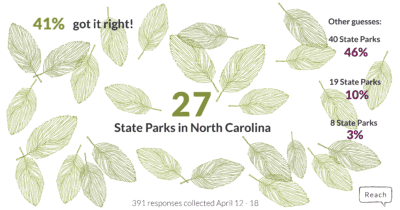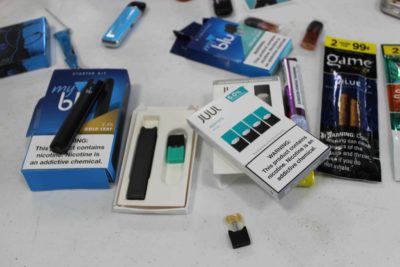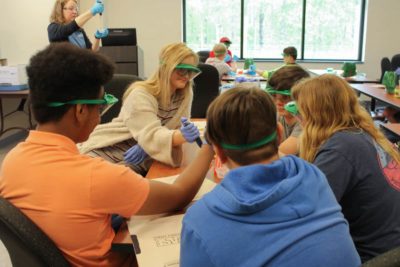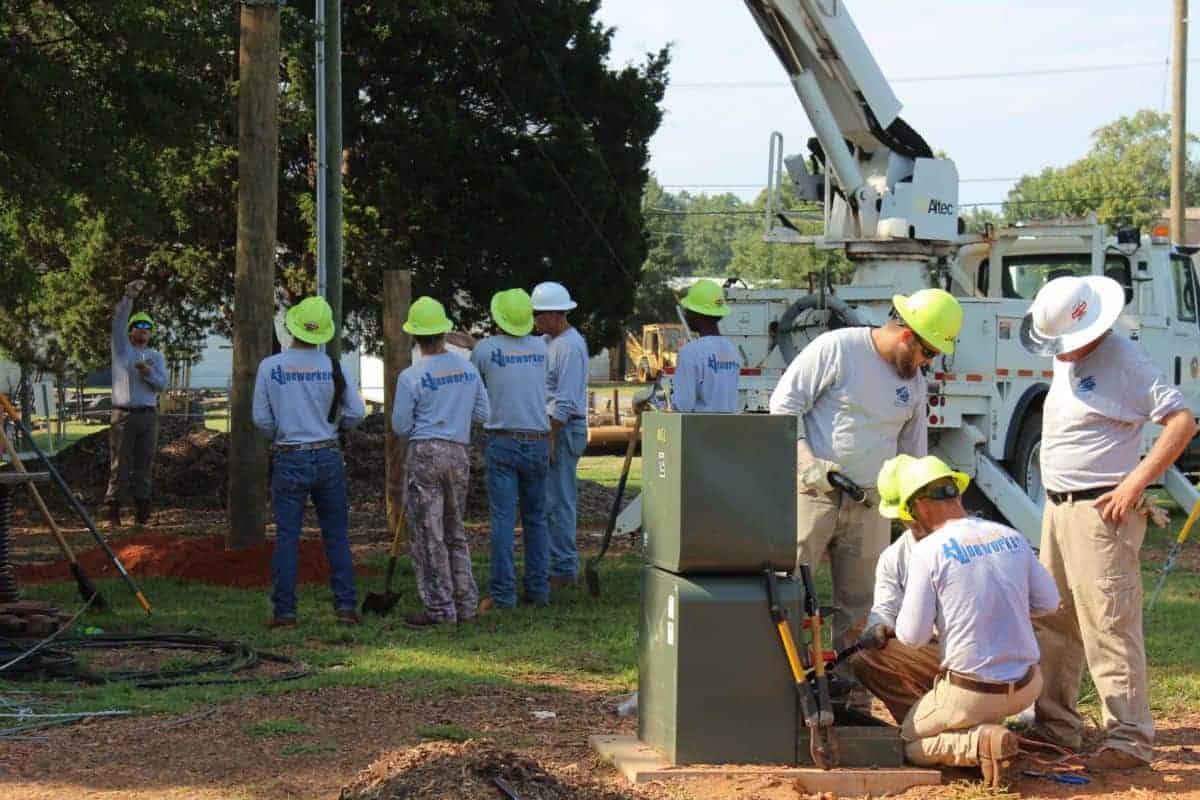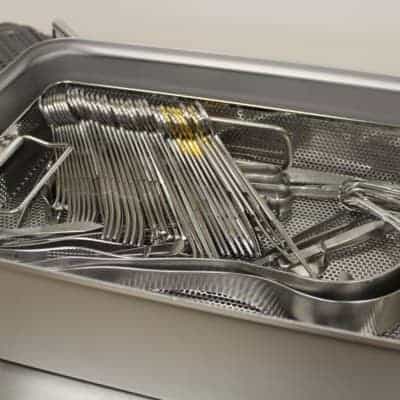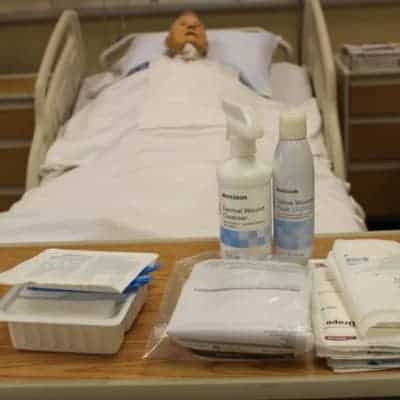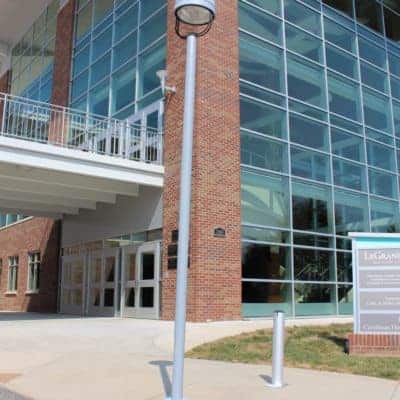My tour of Cleveland Community College, as part of EducationNC’s Blitz Week, started at the top — in the president’s office, where I interviewed President Jason Hurst. He filled me in on the college’s best kept secrets and the area’s hottest jobs, as well as the school’s unique challenges (read the full conversation here) before I went off to see programs on campus first-hand.
Mission Critical Operations
The first stop on my tour was a room full of servers and wires, which may seem unexceptional except for it was the result of a $13.2 million grant where Cleveland Community College, as part of a consortium of colleges, became part of the National Consortium for Mission Critical Operations.
“Data centers are a mission critical operation,” said Chief Information Officer Jonathan Davis. “It has to operate 24 hours a day, seven days a week. The power has to stay on. The data has to keep flowing.”
In the room, servers had two power supplies for redundancy. In the event of a natural disaster, a natural gas powered generator will kick in, and the center includes hyper-sensitive sniffers for any indication of a fire. Computer room air conditioning (CRAC) units monitored temperature, air distribution, and humidity and provided a consistent hum throughout the data center.
“It was definitely one of our best projects,” said Davis. “We tried to make decisions that would not only benefit the students in the program immediately, but also carry forward for us as an institution in the future.”
Industrial Systems Instructor Rodney Cobb said the data center is invaluable for its “real world, data center gear” where students in information technology and operations technology can interact with the units from an HVAC standpoint, run cables, or run electrical.
“We actually monitor the voltage, the wattage, the amperage of what is used in here,” Cobb said. “We use those for classes where they can do energy trending … to see how much energy consumption we used in here.”
The world class data center took six months to renovate and millions of dollars to equip.
“It was like moving out of the slums and into the Taj Mahal,” Davis said. “It was really something.”
Why all the effort? Cleveland Community College is tapping into data center jobs in the county, including data centers for Disney, Boeing, AT&T, Royal Bank of Canada, WhiPro, T5, and others.
These companies are drawn to Cleveland County because of access to the interstate, water resources, economic grants, and, most importantly, the area tends to be safe from natural disasters — no earthquakes and minimal thunderstorms — thanks to being located in the Isothermal Plane. This means fewer issues with constant power.
“They pay very well, especially for a two-year degree when they finish here,” Davis said of the local job opportunities for students. “I would say the starting salary is probably around $50,000 right now, but it goes up to $70,000 starting. … I mean, that’s life changing.”
Advanced Manufacturing Academy
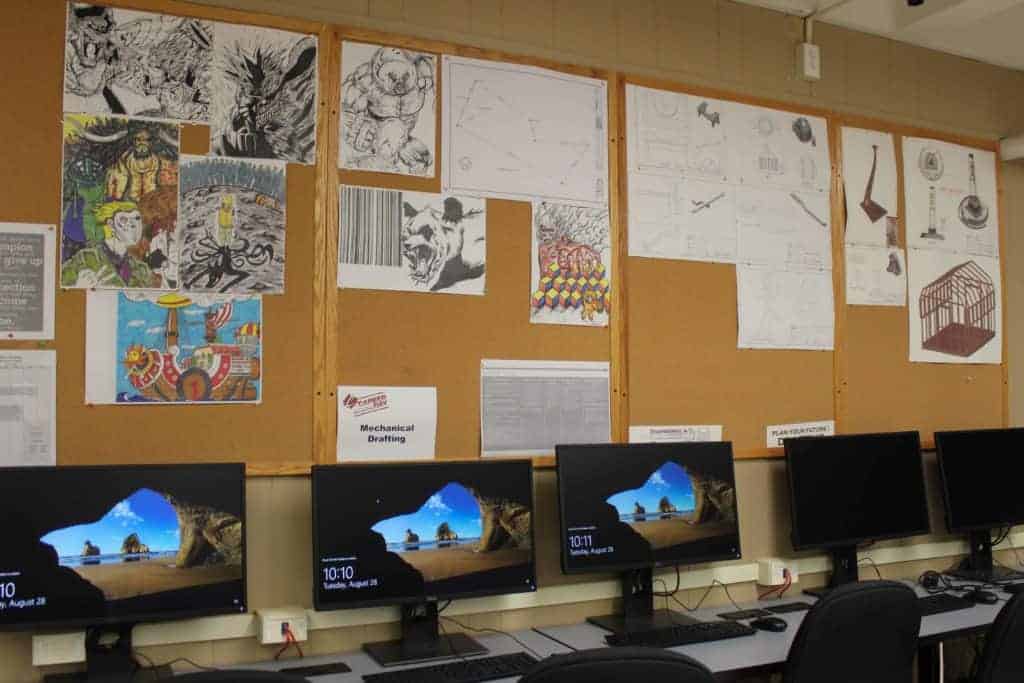
In September, the state announced $9 million in funding for a new advanced manufacturing center at Cleveland Community College. The center will house the college’s current advanced manufacturing courses with room to grow.
Another recent development in advanced manufacturing at the college is the Advanced Manufacturing Academy. The Academy is a partnership with Cleveland County Schools so that rising eleventh graders can enter high demand job courses like welding, automation engineering, computer-integrated machining, industrial systems, facility maintenance, and mission critical operations.
“Once they graduate, they’ll receive a high school diploma. They’ll also get a certificate and a diploma in that area that they selected,” said Bruce Mack, vice president of economic and workforce development. “The plan is for them to enter into the workforce … immediately after graduation.”
The program is in its second year with 16 students.
Cosmetology
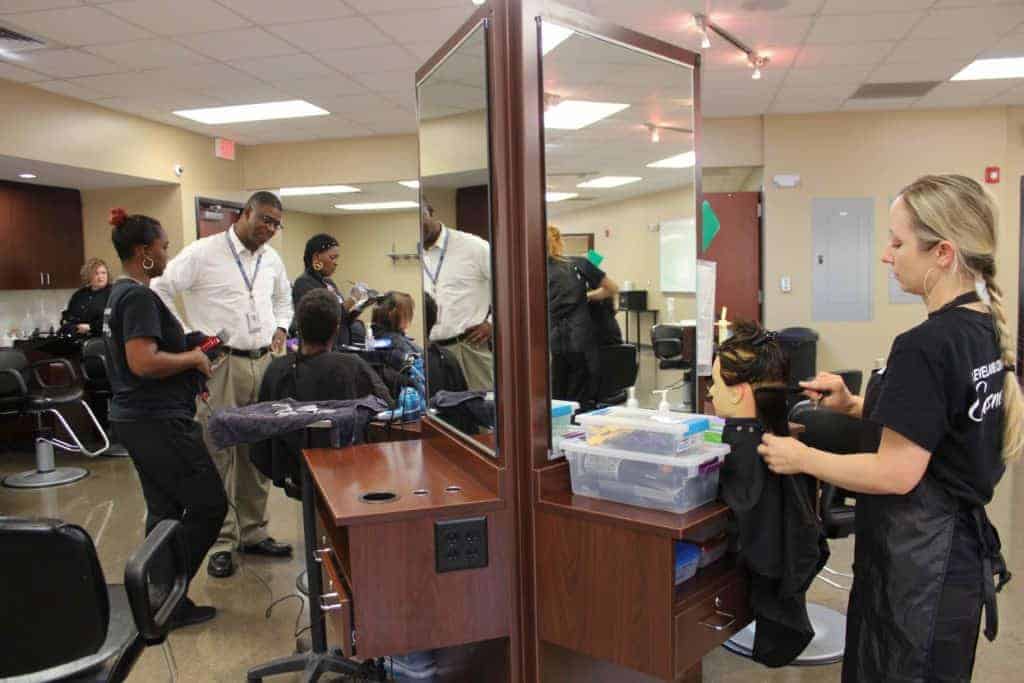
Cleveland Community College’s 55 cosmetology students span from high school to advanced curriculum. On the Tuesday that I visited, it was senior citizen day, where students who had already completed 300 hours of courses could work on live clients and provide discounted hair services.
“For them to have hands-on experience is major because that determines how well they’re going to do in the salon,” said cosmetology, esthetics, and manicuring program coordinator Christina Hill. “We want them to have the actual hands-on experience.”
The skills show with a 100 percent passing rate on practical exams, and the program is growing with the addition of barbering.
“This is very, very new,” Hill said. “There’s not a community college on this side that has barbering. So we’ll be the first.”
The program’s growth is particularly exciting for Hill, who started taking evening cosmetology courses at Cleveland herself while in high school.
“I kind of never left,” she said.
Electrical Lineworker Academy
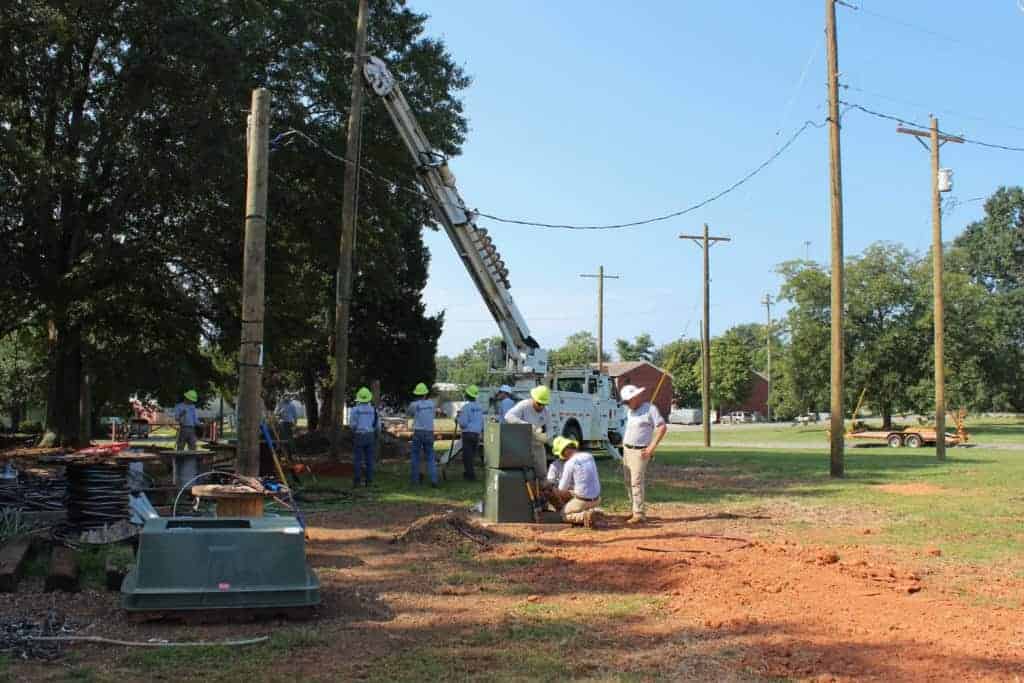
The Electrical Lineworker Academy is a 10-week intensive training to prepare students for jobs in the electrical power industry.
“This is just a great example of how a community college can respond to the local workforce development needs,” said Ken Mooney, vice president of continuing education.
Electrical lineworkers are the men and women that keep the power on, but about two years ago, the cities of Shelby and Kings Mountain came to Cleveland Community College with the issue of finding and retaining these workers.
“We put together an advisory board of local employers. They said ‘we’ll support you,'” said Mooney, pointing to a white bucket truck donated by Kings Mountain. “It’s a very capital intensive program, and you can’t do the training in the classroom. It has to be out hands-on.”
With two grants from Duke Energy and a third from the North Carolina Department of Commerce, the lineworker program launched last year at the college and was wrapping its fifth 10-week, 400-hour class.
“This class will graduate in about three weeks,” said Mooney. “And we’re kind of bragging, we have a 100 percent employment rate so far. They’re all getting jobs, and they’re getting pretty good jobs. Starting pay will be from $16-$20 an hour.”
Many students receive job offers before they even complete the program, which is a good indication of why the program is full through January — with a waiting list. The college now faces expansion challenges in terms of teaching space to meet the rising demand.
“We have a surprisingly high number of guys that have bachelor’s degrees,” Mooney said. “They have four-year degrees that can’t get a job. They’re coming back to do this 10-week program, and they’re going right to work.”
Fire and Rescue
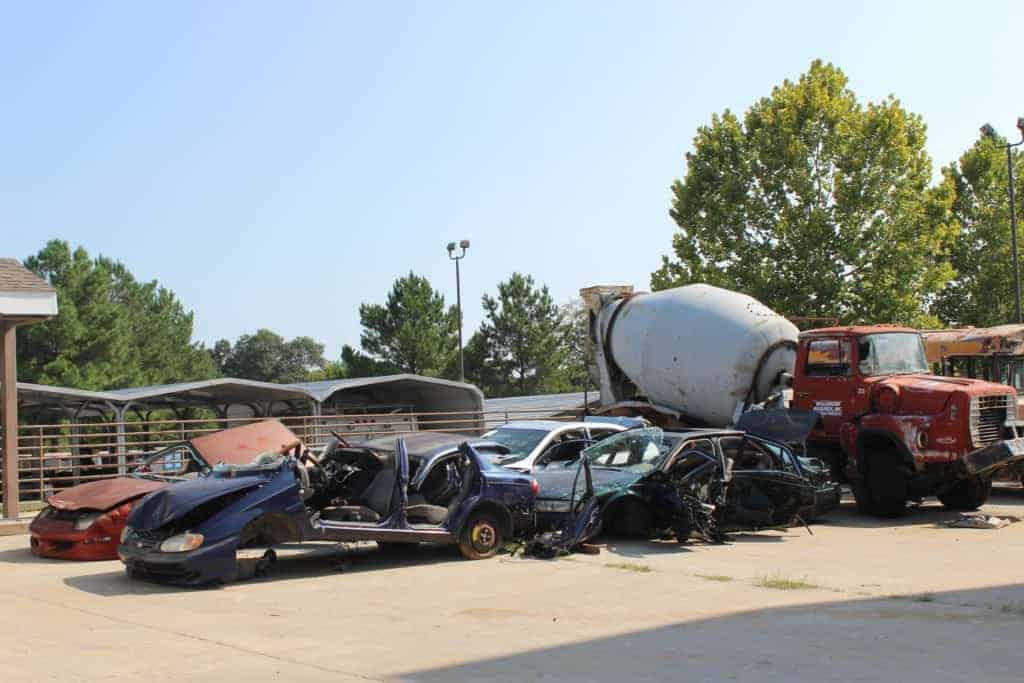
At Cleveland Community College’s nine-week Fire Academy at the Brown Emergency Training Center, approximately 4,000 people come through various programs each year, including 800 at the annual fire/rescue college.
“It used to be, to be a fireman 30 years ago, you just joined. Training was taken serious, but it was mostly done in-house,” said the center’s coordinator, Jimmy Hensley. “Now to get certification they have to come through us.”
Still, even with popular fire rescue programs at the college, Hensley pointed to a common issue: the firefighter shortage, which is a consequence of a broader shift in the way of life in rural communities.
“In Cleveland County and in most of the rural counties across the nation, 30 to 40 years ago, everybody worked in their community. They were farmers, they were mechanics,” Hensley explained. “So in the area that I’m in, in Grover, you had all these people that worked in the town and when there was a fire they would leave, because they were either self-employed or they were farmers and they would leave [to volunteer].”
Hensley also noticed a change in people who join the fire departments. Firefighting used to be a part of family history, passed down as a career in certain families.
“Now, that’s not the case,” Hensley said. “They leave McDonald’s and come out here and take the academy and go to work as a fireman. So it is changing. Instead of it being a direct link to a family history, it’s now anybody.”
While most of the attendees to the fire program do want a job, others just want to be better volunteers. Still, the shortage issue remains, and Hensley says he’s not sure what the answer is.
“The only thing to kind of fix it is more and more paid staff, which is higher taxes and everything, so it’s a tough spot,” said Hensley.
Read how other community colleges are also dealing with the volunteer firefighter shortage here.
Did you know grain bin and hay bale accidents are very real and very dangerous? I learned how the @ClevelandCC fire and rescue team is prepared during my visit today. More fun facts about @NCCommColleges compiled by @EdNCdata here: https://t.co/jUTJzVBU1L@Awake58NC #awake58 pic.twitter.com/OdqNKr32Lg
— Yasmin Bendaas (@yasminbendaas) August 28, 2018
Biotechnology
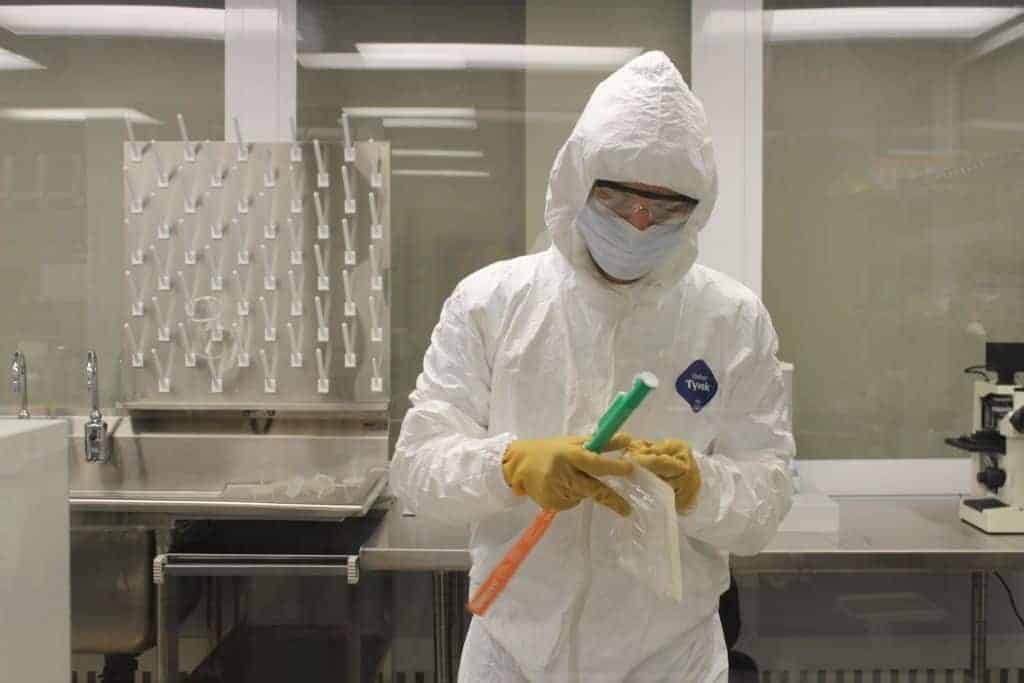
Biotechnology at Cleveland Community College includes basic lab techniques and equipment that would be seen in a typical research or medical lab.
The department also has a clean room to create a sterile environment, which many manufacturing companies also use.
“If you’re building something where a tiny little dust particle could cause your equipment to fail, like maybe a semiconductor or something like that, they’ll build those inside of clean rooms like this one,” said Rebecca Hare, biology instructor and life sciences department chair. “It keeps the internal parts of their equipment sterile and dust free.”
The clean room has HEPA filters for dust removal, which keeps it somewhat loud.
“It’s noisy, and it’s breezy,” said Hare. “So it allows the students to work in that environment so that they get accustomed to do whatever their normal activity is inside this type of environment.”
Before entering the clean room, students enter a gowning room to put on suits that cover from their hair to their shoes to maintain the sterility of the room and learn appropriate gowning procedure.
This sums up how much fun I had @ClevelandCC today. Thanks to Brandon in the cleanroom. @Awake58NC @NCCommColleges @EducationNC #Awake58 pic.twitter.com/HiMiKXEjSF
— Yasmin Bendaas (@yasminbendaas) August 28, 2018
Broadcasting and Production
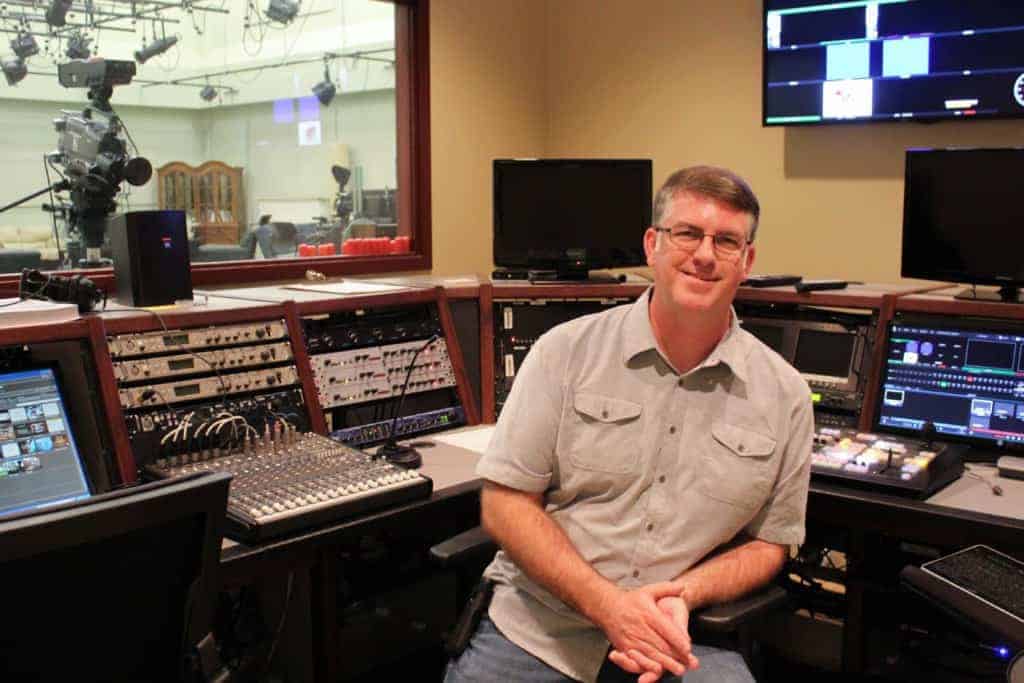
“To your left right here is actually a pet show,” said Tim Foster, broadcast production technician at Cleveland Community College. “Right over there is a background for a music show we just started.”
We were standing in a giant studio space with multiple sets where shows are recorded to air on C19TV, the broadcast service of the college.
“Our longest running show is Talk to the Town,” Foster said. “We’re getting ready to hit 800 shows for that particular program.”

“The interesting thing about this studio, if it’s not the largest, it’s one of the largest in North Carolina for a community college,” said Foster.
With the studio, not only can production take place for the local TV channel, but students also get hands-on experience working on shows. Students in Video 1 learn how to shoot and edit with smaller cameras. In Video 2, students get to do production in the studio on $20,000 cameras. A mobile production truck also helps capture scenes outside of the studio.
“We’re doing high school football next Friday night,” Foster said. “With the truck we have the same set up as the control room so we can go to a football stadium, we can do parades, we can go to uptown Shelby, we can go to downtown Kings Mountain, we can go do concerts at the Don Gibson.”
A giant green screen also helps create different backgrounds for a variety of shows in studio, from a faith-based show to a movies show, and allows students to get all-around production experience.
And airtime is an agreement between the college, the county, and Spectrum Cable.
“People watch,” Foster said. “More than you realize.”
Final Notes
My tour also included a stop in Allied Health to visit nursing and the surgical technology program. I also had the chance to visit the LeGrand Conference Center — housing multiple offices, expandable meeting spaces, and a full catering kitchen for local business events.
Keep up with all of our community college coverage @Awake58!
Recommended reading
